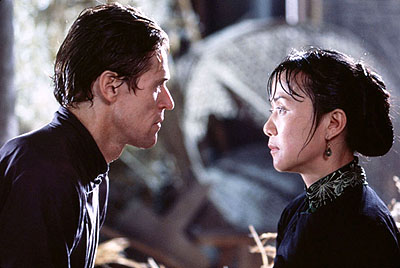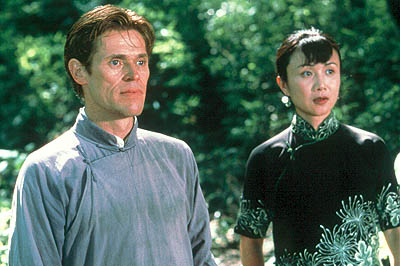

There is something inherently wrong with watching movies that should not be. Everybody in Pavilion of Women, adapted 'loosely' from the book by Pearl Buck, speaks English, although the story takes place in 1937 China, and only two characters are not Chinese. Maybe it's because Chinese is a language many in America are not familiar with, unlike French or German. Maybe it's because the English level of the actors in Pavilion of Women is all over the place, from fluent to barely understandable. Either way, watching some of these actors struggle through their lines is not pleasant, and detracts from their performance. They sound awkward, and look uncomfortable. Mandarin Chinese is a beautifully, lyrical language. It would be much better to hear the actors speak in the native language, and much more natural. Watching, say Javier Bardem speak in Spanish versus English is better, hands down. Other foreign actors like Catherine Deneuve and Stellan Starsgard is fine either way, because they are fluent in their own language and in English. Jackie Chan gets away with it, because he sounds goofy and his movies are goofy. Notice how imposing Chow-Yun Fat is, and how little he speaks in his English movies.
Anyway, Pavilion of Women is a bad experience, only made worse by the English. If everyone is speaking in English, why are they singing in Chinese? And why does a Chinese name need translation? Pearl Buck won the Nobel Prize for Literature, for among other books, The Good Earth. This movie takes the book and washes away all the layers into a bad movie about romance and independence. Madame Wu (Luo Yan, A Lady From Shaan Bei, Extraordinary Years) is tiring of her life as a wife. In reality, she tires of serving her husband. She finds him a new concubine, Chiuming (Yi Ding, The Amazing Panda Adventure, The Water Ghost). Wu's son Fengmo (John Cho, Bowfinger, American Pie) is also developing a sense of independence. He does not understand why he needs to respect outdated customs and wants simply to decide for himself. He is nearing the age where he must marry, and he wants to marry for love. He is falling in love with Chiuming, which of course is a bad thing. Wu hires Andre (Willem Dafoe, Shadow of the Vampire, American Psycho), an American missionary, to teach him about the foreign world. Chiuming and Wu sit in on the lessons, and Wu and Andre begin to fall in love.
Director Yim Ho (Kitchen, The Sun Has Ears) and adapters Paul R. Collins, Ho, and Yun handles each romance clumsily. Developments are obvious to everybody except those involved. Characterization stays at a minimum level. Stories about breaking free from cultural shackles and the search for independence are not new, and there is absolutely nothing new here. There are many things in Chinese culture to oppress the independence of women, especially against the backdrop of increasing communism, and Pavilion of Women feels the need to touch upon each lightly. This movie was made with the cooperation of China (like Restless, a better movie) and strays away from any controversial topics. Pavilion of Women never truly explores the alienation that Wu and Andre must feel, and also never explores his motivations as a missionary. Dafoe, coming off an Academy Award nomination is dull and lifeless. Cho has it the worst. Look carefully, and Cho is everywhere. He has small roles in many movies and television shows. This is his first decent sized role, and it is a stinker. The film gets worse as it nears its conclusion. Every time the movie feels like it's going to end, it keeps going. Each additional segment is worse than the last. The final scene looks like a piece of bad propaganda.